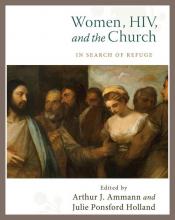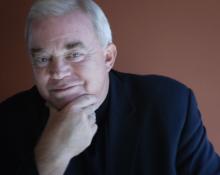Leadership

When furloughed Peace Corps worker Angela Kissel showed up to support Sojourners’ Faithful Filibuster on Capitol Hill in September, she was surprised to be handed a Bible and invited to read from the podium some of the more than 2,000 biblical verses related to poverty and justice. —The Editors
READING SCRIPTURE outside the Capitol may not seem like a momentous occasion, but for me it was divine. You see, the day before, a well-intentioned pastor told me my place in the church was limited to specific roles because I’m a female. He told me it was against scripture for any female to preach, that roles for leadership are clearly only for men, the “father” figures of the church.
In response, I listed every female prophet and leader. I went through the patriarchal lens in which parts of the Bible are written due to culture and general misogynistic norms of the time. I noted the hypocrisy of highlighting some scriptures while blatantly overlooking others when it doesn’t fit the current agenda. And lastly, I walked through Jesus’ ministry and discussed how he went against cultural norms to illustrate the equality of women to the extent of choosing a woman to tell the world the full story of the gospel.
After an exhausting 65 minutes, we agreed to disagree. We prayed and ended the conversation. I walked away drained and slightly defeated. I wondered why God had put something on my heart and empowered me to speak up, when God knew I’d lose the battle. I also started to question myself and wondered if I should just stop fighting.

Last week, a controversy erupted over Twitter when it came to light that a prominent evangelical conference with 110 speakers only had four women on stage.
Journalist Jonathan Merritt, did a quick informal study and discovered that out of 34 prominent evangelical conferences, only 19 percent of speakers at plenary sessions were women.
This is a problem.
As a white male evangelical and a black female evangelical who spend a lot of time speaking at conferences, events, and college campuses, we know from experience this is a problem.
Conference spaces have become one of the primary discipleship spaces for evangelicals. These are the spaces where evangelicals go to learn all that it means to be a follower of Jesus.

IT IS EASY, and a lot more comfortable, to identify and name dysfunction outside your family. It’s an entirely different endeavor, however, to label inappropriate behavior in your own home.
That’s the situation I find myself in as a lifelong member of the black Baptist tradition—one that, by and large, refuses to ordain women ministers and call them into the pastorate. I can no longer keep silent. My spirit won’t let me be quiet about a system where injustice is nurtured.
Women are the backbone of African- American Baptist congregational life, yet they traditionally have been blocked from ordained ministry. I’ve watched this for years in Kentucky where I was born, raised, and currently live; experienced it in other places where I have resided; and heard the same story from Baptist female colleagues in ministry around the country. The same is also true in many white Baptist congregations, such as those affiliated with the Southern Baptist tradition. But I’m speaking here about the world I know personally.
Ironically, some of these black congregations and pastors who are unwilling to honor God’s call on the lives of women seeking ordination are the same ones who are quick to name a plethora of injustices perpetrated against black people as a race, and to demand quick resolution.
Doors for women called to preach the gospel of Jesus Christ have opened a little in recent decades. More women are being licensed, the precursor to ordination in the Baptist structure. But the process usually stops there, and women are left patiently waiting to be blessed into the fold. These “ladies in waiting” are allowed to lead ministries, teach, and occasionally preach, but rarely permitted to go beyond that.

It was a strange, but telling, spectacle when those who billed the government millions for working on its Affordable Health Care registration system denied any accountability for the portal’s astounding failure.
“The other guy did it,” as they say in court. The client kept changing specs, no one did any whole-system testing, other vendors are to blame — blah, blah, blah.
Whatever shred of truth lay in their blame-shifting ran up against another wall of non-accountability. The Republicans did it with their insane sequestration, said Democrats. The Democrats did it, said the GOP. Health and Human Services did it. The Oval Office did it.
In the end, of course, no one will accept accountability, for we live in an age when the “buck” never stops on one’s own desk, if it stops at all.

Microsoft CEO Steve Ballmer’s surprise decision to retire does more than throw the technology industry into a frenzy of speculation. It raises the problem of succession.
From major corporations to startups led by visionary leaders, from universities to churches, the departure of the top leader can stop momentum and usher in months, perhaps years, of uncertainty.
Even though dealing with succession is a primary task for a board of directors — some say it’s their preeminent task — relatively few boards take the assignment seriously. They focus instead on the easier work of jousting with the top leader and shilling for institutional investors.
What should be an orderly process of preparing for leadership transition instead becomes a lurching from one standalone regime to the next.
Many board members want the rush of being co-managers of the institution. This is especially true in churches, where boards enjoy making day-to-day decisions about operations. Since a strong central leader would get in their way, many church councils discourage strong clergy and reward compliant permission seekers.

I SPENT MY first year after college doing voluntary service in Portland, Ore., serving as the hunger action coordinator for a small Catholic organization called the Oregon Center for Peace and Justice. That fall, I joined a group of church anti-hunger activists from around the state in a meeting with our Republican U.S. senator, Mark O. Hatfield. We asked him a number of questions, and urged his continuing support for food- and hunger-related legislation.
When it came my turn, I said, “Senator, how do you reconcile the compromises that you inevitably have to make as a politician with the ideals you hold as a Christian?” In his reply, Sen. Hatfield pointed to the difference between compromises of principle—which he said he would never make—and the tactical compromises necessary to make progress in a pluralistic society. Without the latter, the senator said, politics is nothing but an ideological shouting match.
These days, it’s clear that most far-right Republicans, including those in the party’s leadership, take a slightly different approach to inter-party cooperation than did the late Sen. Hatfield. They seem to see it less as building bridges for the sake of governing a varied society and more as sleeping with the enemy.
There’s probably no better recent example than the issue of health care. The Affordable Care Act, aka Obamacare, is the law of the land—passed by Congress, signed by the president, and ruled constitutional by the Supreme Court. But none of those legal niceties seem to matter to the raw-meat GOP. Their attempts to circumvent or undercut the law range from the inane (such as 67 failed tries—count them: 67—to overturn the ACA by congressional vote) to downright bullying.
POPE FRANCIS HAS created a new environment in the church. Beginning with asking all the people in St. Peter’s Square to bless him, living in a humble apartment and not the papal palace, placing his own phone calls, paying his own bills, giving simple daily homilies, having conversations with many people, and joyfully mingling with people: These all characterize an incredibly different pope. What has been even more attractive about Pope Francis than his style has been what he has said.
Pope Francis is clearly not on a mission to preserve the status quo. He’s been outspoken about the need for change in the world and in the church. In this he has not been a “professional denouncer.” Rather, he always contrasts what needs to change with the opportunity to be so much more than we are now. Whether it is oppressive global economic policy or clerical ambition, Pope Francis points out that we are called to something more noble and satisfying. The call of Christ is to be our best self. Francis reminds us, “God always forgives. Don’t forget this. God always forgives.”
Another striking aspect of Pope Francis is his constant and passionate concern for people who are poor and vulnerable and his reminder of our responsibilities to them. Whether he is talking to world leaders, bishops, or general audiences, his love of poor people and his firsthand knowledge of their challenges and how we should respond is profound.

For Catholics—and many others—what happens in Rome doesn’t stay in Rome. The seating of a new pope has the power to affect believers across the globe, in ways direct, indirect, and unpredictable. And when a surprising sea change occurs in a hide-bound, steeped-in-tradition place like the Vatican—the unexpected resignation of a pope, the selection of a Jesuit from the Americas as his replacement, and the powerful symbolism of a new leader who literally stoops to wash a Muslim woman’s feet—people of faith of all traditions sit up and take notice.
In these early days of Francis’ papacy, we asked three prominent Catholic thinkers and leaders to help us understand what it all might mean. How will the spirit of reform that has marked Pope Francis’ first few months in office affect the worldwide church? Will change at the top trickle down to parishes and neighborhoods here in the United States and elsewhere? And what will Francis’ leadership mean not only for Catholics, but for all people of faith engaged in the work of making justice and building peace? —The Editors
CATHOLICS AROUND THE WORLD are transfixed by Pope Francis. We love his simplicity of life, his humble faith, his welcoming attitude to all, and his way of being Christian in the contemporary world that takes its bearings from the poor. Lace and gilt are no longer fashion statements at the Vatican. From his small apartment, the pope speaks bluntly about worrying less about rules and more about love. An utterly refreshing breeze blows through the Catholic Church.
But what does it really mean for Catholics today? The church still reels with the moral and spiritual damage done by members of the clergy as perpetrators or accomplices in the sex abuse scandals, from fiscal mismanagement, and from institutional infighting. Does Pope Francis change that? And what does the new pope signify for the young, for women, and for the many issues that vex the church’s engagement in today’s world?

THE TERM “DIVERSITY” in professional and educational circles in the United States is frequently mentioned as positive on its face, needing no justification. “Diversity is our strength” or “diversity enriches us” are common statements.
But Harvard professor of comparative religion Diana Eck points out that diversity is simply a demographic fact—a situation in which people with different identities live in close quarters. The term says nothing about how those people get along with one another. Frankly, if all we knew about religious diversity in particular were the stories carried on the international news, it would be hard to conclude anything except that the close gathering of Muslims, Christians, Jews, Buddhists, Hindus, and others is nothing but a recipe for conflict.
Religious conflict is especially deadly because the participants believe they are fighting for cosmic reasons—where death may be welcomed as martyrdom—and religious communities are the largest repositories of social capital in many civil societies, providing endless amounts of energy, people, and resources to mobilize.
But what if the social capital among religious communities could be bridged and people who orient around religion differently could be convinced to cooperate with one another? What if the cosmic narratives of religious traditions viewed people of other faiths as partners in the quest for the kingdom on earth? This is the hope of the interfaith movement, and building this movement is the job of interfaith leaders.
Whom Shall I Send?
Drawing on years of pastoral and executive experience in churches and parachurch organizations, Sherry Surratt and Jenni Catron deliver on the pragmatic promise of their book's title, Just Lead! A No Whining, No Complaining, No Nonsense Practical Guide for Women Leaders in the Church. Jossey Bass
Giving Thanks
Dreams. Wind. Bread. Oriental rugs. Puppet shows. These are a few of the inspirations for Benedictine Brother David Steindl-Rast's 99 Blessings: An Invitation to Life. These short, concise, sometimes whimsical prayers of gratitude for gifts great and small are invitations to increase our awareness of life's daily wonders. Image

I just spent a wonderful and encouraging weekend with a church leadership team from Reisterstown, Md. I came away filled with hope for this congregation and with admiration for their clergy and lay leaders.
I wish our weak and tiresome political leaders in Washington and state capitals could visit this church in northern Baltimore County and see how mature adults of diverse backgrounds and viewpoints manage to put the congregation first.
They listened, spoke without barbed words and without aggression garbed in niceness.
They voiced their dreams, heard their differences, and then allowed a consensus dream to emerge. They understood the need to move on from yesterday. They were like two healthy parents trying to work a family problem. They seemed to trust each other.

In the past 20 years, the world has witnessed the death of social contracts. We have seen a massive breakdown in trust between citizens, their economies, and their governments. In our own country, we can point to years of data painting a bleak picture of the confidence Americans have in any of our traditional institutions.
Former assumptions and shared notions about fairness, agreements, reciprocity, mutual benefits, social values, and expected futures have all but disappeared. The collapse of financial systems and the resulting economic crisis not only have caused instability, insecurity, and human pain; they have also generated a growing disbelief and fundamental distrust in the way things operate and how decisions are made.
This week at the World Economic Forum in Davos, Switzerland, we are looking to the future and asking “what now?” At a Saturday session — “The Moral Economy: From Social Contract to Social Covenant” — a document will kick off a year-long global conversation about a new “social covenant” between citizens, governments, and businesses.
This is really “a call” for worldwide discussion about what values are needed to address the many difficult challenges and choices the world is now facing. Inequality, austerity, retrenchment, constraints, mal-distribution, growing conflicts over resources, and extreme poverty all raise questions about our values.

Wise leaders spend time in the wilderness.
Some choose a sojourn in the desert; most are driven there when their leadership fails.
In the desert, beyond their cocoon of comfort and success, they see more about themselves. If they stay in the desert long enough, they come to understand what they see about themselves. Stay still longer, and some even come to appreciate themselves.
And a few whose desert wanderings go past endurance stop focusing on themselves at all. They discover people and God. Those become the great leaders. They move far beyond self-serving, calculation, manipulation, cleverness, methods, and successful habits. They find common ground with humanity in its brokenness and aspirations, in its resilience and its daily acts of common goodness.
We live in an era of weak and absent leadership.

EXCLUDING WOMEN from leadership weakens the commitment and contributions of churches, theological institutions, and the global church in their participation in God's prophetic mission. It translates to women's priorities and specific needs being inadequately articulated and under-resourced.
For instance, matters of sexuality, reproductive health education, and justice are hardly ever discussed in churches or theological institutions, except when governments want to legalize abortion. Similarly, little attention is given to maternal health care despite the high rates of maternal death and infant mortality in Africa. It is not enough for churches to focus on baptizing children, blessing them, and welcoming them into the house of God when they neglect to care for their well-being from the time they are in their mothers' wombs, especially now that so many children are born HIV-infected. Responsible and healthy sexuality, childbearing, and parenting are matters that require full engagement of both women and men, and the churches should be at the forefront of providing much-needed education.
Women have been left to shoulder the burden of the times: preventing HIV transmission, facing HIV-related stigma, handling deaths, and addressing the myriad other adverse impacts that the HIV pandemic has created. Similarly, in the Circle of Concerned African Women Theologians, of which this author is a founding member, women have provided leadership in naming theological, ethical, cultural, and religious beliefs, as well as harmful practices and leadership styles, that fuel gender disparity, social injustices, and the spread of HIV in religious communities and in society at large. The Circle also has endeavored to provide theological and ethical reflections that are empowering and transformative to the behaviors contrary to God's will for how women and men relate to each other in families, religious contexts, and everyday life.
RICHARD VIGUERIE is as responsible as anyone for the success of the conservative movement in this country. A pioneer in political direct mail, Viguerie has been involved from the radical edges of the Right in every Republican campaign from Goldwater to Romney; he's been called the "funding father of the conservative movement." He helped start hundreds of entities from Conservative Digest to Gun Owners of America, from the National Conservative Political Action Committee to the Moral Majority—spanning the political spectrum from Right to Far Right. Just before the 2012 election, he launched MyOwnSuperPAC because of "frustration at how weak and ineffective the Romney campaign's ads have been with its soft approach to Barack Obama—hardly ever mentioning Obama's radical, neo-Marxist vision for America's future," and insisting that "Obama is NOT failing. He's succeeding at doing exactly what he set out to do—and that's destroy capitalism and destroy the America you and I grew up in." So no one is going to mistake Viguerie for a squishy liberal.
And yet Viguerie's Catholic faith has led him to a surprising position on the issues of capital punishment and prison reform. The conservative icon talked with Sojourners editor-in-chief Jim Wallis in September about why he thinks an unexpected Left-Right alliance might turn the tide against the death penalty.
Jim Wallis: As you and I both know, we're often stuck in political straitjackets. There are issues that we could work together on, particularly as people of faith, that would help politicians do better than they sometimes do. I'd like to start with this: You've said that, as a Catholic, you're against the death penalty. Why is your faith as a Catholic central to this, and how has that turned you against the death penalty?
Richard Viguerie: My own road to Damascus on this issue came many years ago. When I was a young Republican in Houston in the late '50s and early '60s, I was a very hard-core, law-and-order type: "lock 'em up, throw the key under the jail so they never get out." In those days, law enforcement agencies were kind of immune from criticism. Over a period of time, I and many other conservatives have been disabused of the fact that people in law enforcement are above any mistakes or abuse of power.
I’VE ALWAYS LOOKED forward to Advent. It’s a time each year of expectant hope—the hope brought by the coming of a child, born in an animal stall in Bethlehem, who would change everything. It is the time of year when I am reminded again of the choice we always have between cynicism and hope. That’s ultimately a spiritual choice, and Advent is a formative season that nurtures the choice to hope, which can guide our decisions and actions.
This fall, Sojourners launched a new project called Emerging Voices, and it’s one of the most hopeful initiatives I have been involved with in a long time. It aims to mentor, develop, and promote the most dynamic up-and-coming communicators—speakers, preachers, and teachers—who are called to lead and publicly articulate the biblical call to social justice.
The vision for this project is exciting and something to be celebrated. It also calls to mind a critical observation: Our world often wants saviors, not prophets; new messiahs, not leaders. We want heroes with superhuman strength who save the day, not mere mortals who speak the truths we typically don’t want to hear. Even the modern-day giants of social justice—Dr. Martin Luther King Jr., Dorothy Day, and Mahatma Gandhi, for example—were at best prophets, but never saviors.
It’s easy to slip into the mentality that one person, one voice, will rise up in a generation, and that she or he will change the world as we know it. Dr. King spoke of this temptation as the “drum major instinct.” It is the basic desire of humans to lead the charge and, ultimately, reap the recognition—or, at the very least, to place our confidence in a single human being.
I'VE BEEN INVOLVED in public education for more than 15 years—as an urban public school teacher, a researcher and policy analyst, a teacher trainer, a parent, and an advocate. I never dreamed I’d live to witness such raucous and juicy debates about how to improve our nation’s lowest-performing public schools. Throughout my career, public education garnered the occasional feel-good story about a phenomenal, mythical “inner city teacher” and, more often, the litany of stories about how urban and rural schools are in complete disarray.
But during the last few years—oh my! We’ve witnessed the onslaught of message-laden documentaries such as Waiting for “Superman” and The Lottery, which are celebrated by many and derided as teacher-bashing propaganda by others. The birth of the “education reform” movement has generated such groups as Democrats for Education Reform, Students for Education Reform, and Stand For Children. Again, lauded by many, these groups are vigorously criticized by others because of the way they push against policies, structures, and institutions in public education.
Regardless of what side of the education reform debate we may choose, most Americans agree on one thing: Public schools must improve. The academic achievement gap between wealthy white students and low-income students of color must be eliminated. It’s unconscionable that 50 percent of kids growing up in poverty drop out of high school. How do we allow a system to exist where poor children in the fourth grade are already performing three grade levels behind children in wealthier neighborhoods? What future do we anticipate poor and minority children will have with these academic outcomes?
A few weeks after the October 2002 plane crash that killed Sen. Paul Wellstone, his wife, Sheila, their daughter, Marcia, and five others, a Lutheran confirmation class visiting D.C. from Minnesota decided to stop by Wellstone’s office to pay their respects. As the group went through security at the Senate office building, one of the students—who had worked on the senator’s re-election campaign and was still wearing a Wellstone button—set off the metal detector. The officer took her to the side to wand her. As he was checking her, the guard said, “Not one other senator in this place knows my name; Paul Wellstone knew my kid’s name.” He and the student hugged each other, and both started weeping.
Paul Wellstone touched people’s lives in profound ways, mostly because he genuinely sought to live a life of integrity, in both public and personal matters. He once advised, “Never separate the life you live from the words you speak,” and those who knew him best said he honestly tried to follow that advice. (A Midwest political observer said the Right never knew what to do with Wellstone, because he lived “conservative values” at home while working for progressive change in the public sphere.)
Wellstone’s political career began when, as a political science professor at Minnesota’s Carleton College, he started working with farmers to block electric lines forcibly run through their farms—and he continued to organize and agitate on behalf of regular people for the rest of his days.
Bob Hulteen, a longtime Minneapolis-based activist (and a former Sojourners editor), said that Wellstone respected people more deeply than “any politician, or church leader, I’ve ever met—and, maybe most important, he didn’t take himself too seriously.” But Wellstone never underestimated the seriousness of his work for a better world, which is why, a decade after his passing, we asked several people who have been touched by his life in various ways to offer their thoughts on the legacy of a man who continues to offer a model of inspiration, integrity, and hope—attributes that are profoundly needed, in this and any election season.
—The Editors

A FEW YEARS back, Sojourners editor-in-chief Jim Wallis and I did a talk together at Northwestern University. After the event, the line to see Jim was dozens of people long. They wanted him to sign their books, to offer encouragement on their new social justice projects, to meet their kids, to give pastoral advice on a problem they were having. Jim talked to each and every one of them, some for several minutes. It delayed our dinner by at least an hour.
As we were finally sitting down in the restaurant and tucking in to our salads, I asked Jim why he stayed for so long. Why not do what so many other public figures do—leave right after your part of the show is over?
“I am a preacher and a pastor,” he answered. “An important part of my vocation is spending loving time with individuals. The period right after a public talk is an excellent opportunity to do that.”
“Plus,” he added, with a twinkle in his eye, “listening to other people’s stories may be the best part of this work.”
I just hit the 10-year mark of running Interfaith Youth Core, and the 15-year point of my first involvement with interfaith work. I haven’t logged as many miles or given as many speeches as Jim, but my schedule tends in a similar direction. The image of him talking to all those young people after that event at Northwestern sticks in my mind every time I board an early flight or prepare for a day of workshops followed by a late-night keynote.

There is hardly a more controversial political battle in America today than that around the role of government. The ideological sides have lined up, and the arguments rage about the size of government: how big, how small should it be? Some famously have said government should be shrunk so small that it "could be drowned in a bathtub."
But I want to suggest that what size the government should be is the wrong question. A more useful discussion would be about the purposes of government and whether ours is fulfilling them. So let's look at what the Bible says.
The words of Paul in the 13th chapter of Romans are perhaps the most extensive teaching in the New Testament about the role and purposes of government. Paul says those purposes are twofold: to restrain evil by punishing evildoers and to serve peace and orderly conduct by rewarding good behavior. Civil authority is designed to be "God's servant for your good" (13:4). Today we might say "the common good" is to be the focus and goal of government.
So the purpose of government, according to Paul, is to protect and promote. Protect from the evil and promote the good, and we are even instructed to pay taxes for those purposes. So to disparage government per se — to see government as the central problem in society — is simply not a biblical position.